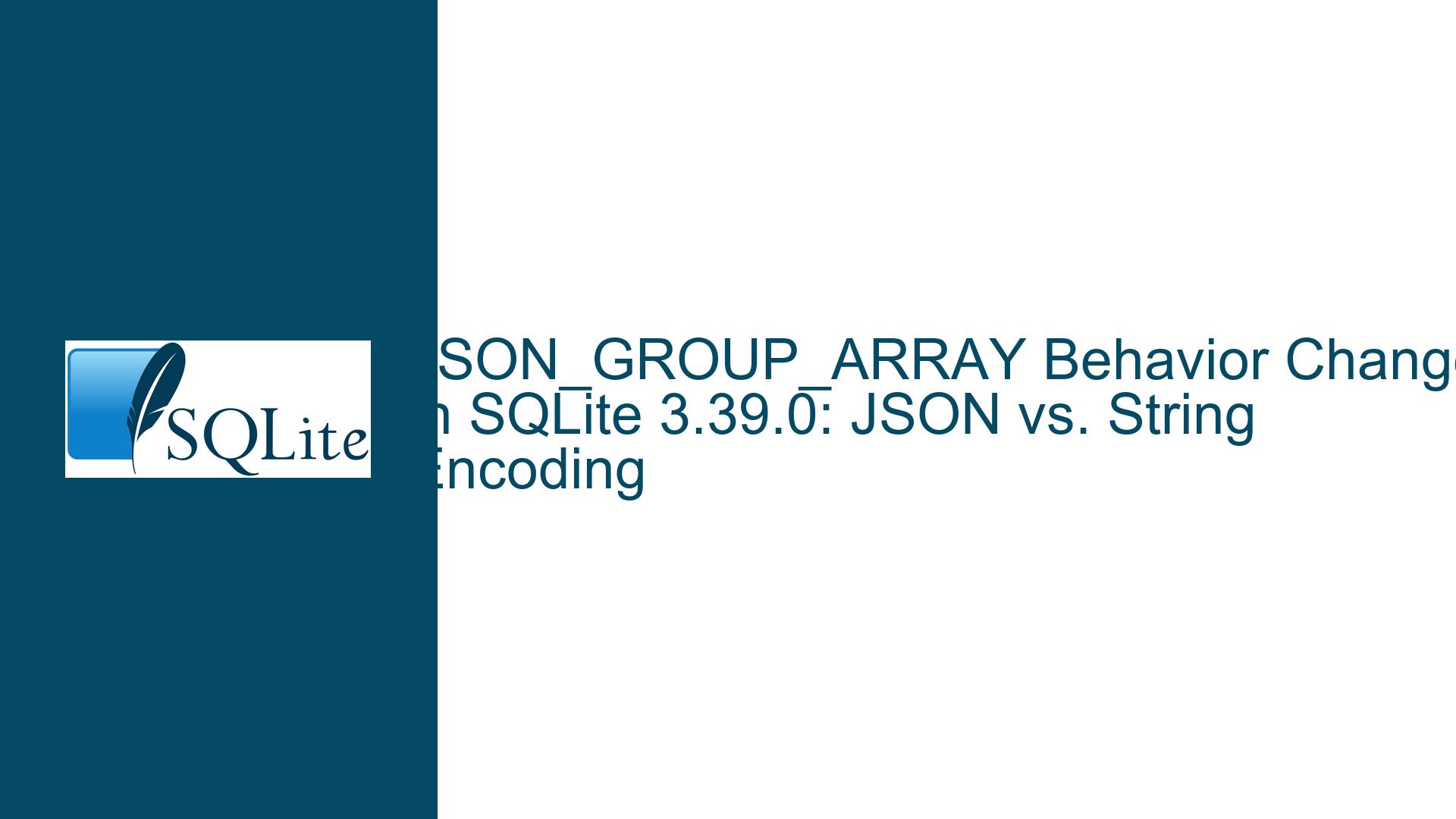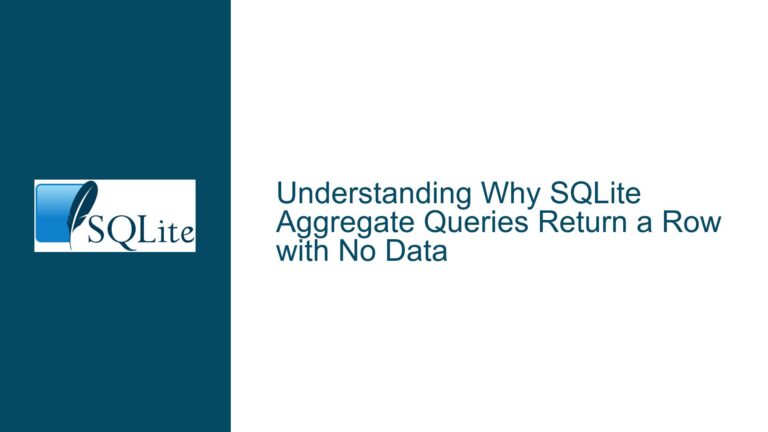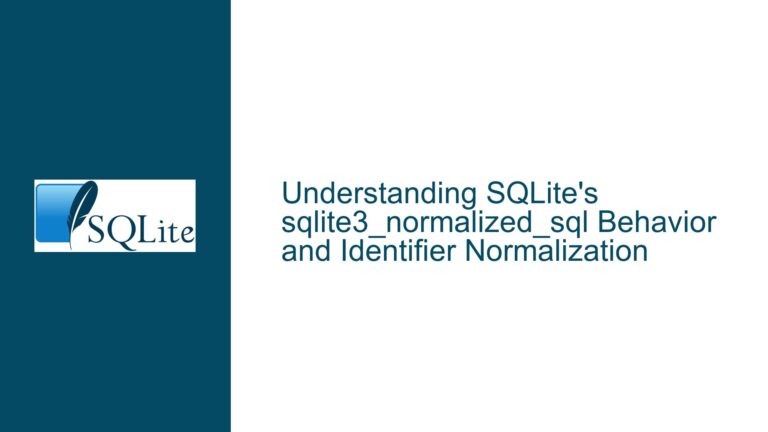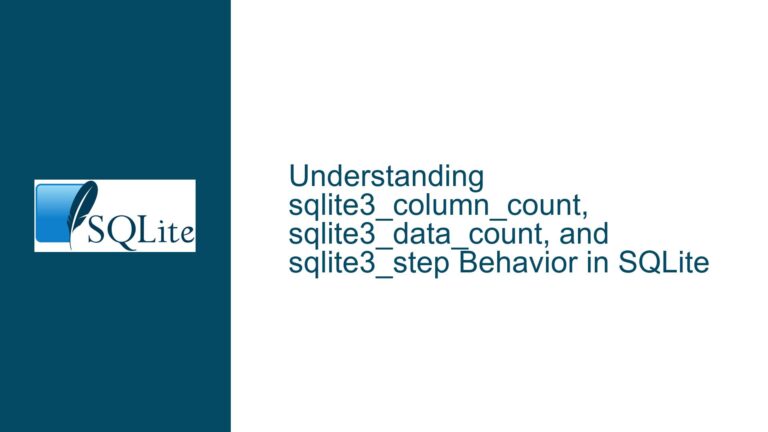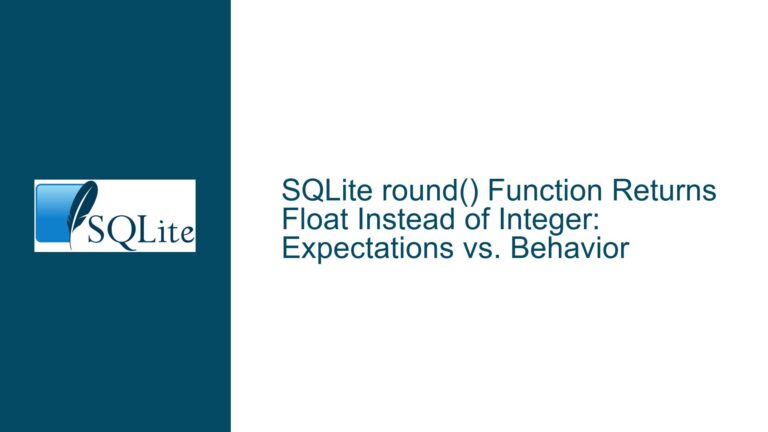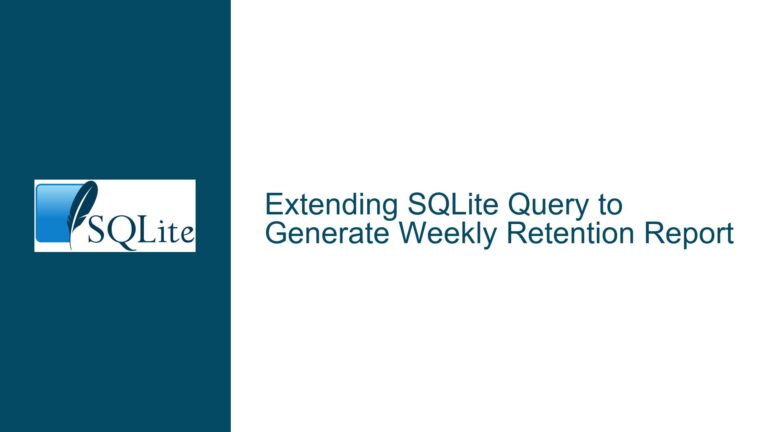JSON_GROUP_ARRAY Behavior Change in SQLite 3.39.0: JSON vs. String Encoding
JSON_GROUP_ARRAY Encoding Behavior Change in SQLite 3.39.0
The behavior of the JSON_GROUP_ARRAY function in SQLite underwent a significant change starting with version 3.39.0. Prior to this version, when JSON_GROUP_ARRAY aggregated JSON values into an array, the resulting array elements were treated as JSON objects. However, in SQLite 3.39.0 and later, the same function encodes the array elements as JSON strings instead of JSON objects. This change has implications for applications that rely on the previous behavior, as it alters the structure of the JSON output.
For example, consider a scenario where a parent-child relationship is modeled in a database, and the goal is to generate a JSON object for each parent that includes an array of their children. In SQLite 3.38.5, the JSON_GROUP_ARRAY function would produce an array of JSON objects. In SQLite 3.39.0 and later, the same function produces an array of JSON-encoded strings. This change can break existing applications or require modifications to handle the new output format.
The issue arises because the JSON_GROUP_ARRAY function now treats its input as a string if the input is not explicitly cast to JSON. This behavior is a correction of a previous inconsistency, as the pre-3.39.0 behavior was technically incorrect. However, the change was not documented in the release notes for SQLite 3.39.0, leading to confusion among users who encountered unexpected behavior in their applications.
Causes of the JSON_GROUP_ARRAY Behavior Change
The root cause of this behavior change lies in how SQLite handles JSON values internally. In SQLite, JSON values are stored as text, and the database engine provides functions like JSON_OBJECT and JSON_GROUP_ARRAY to manipulate and aggregate these values. Prior to version 3.39.0, the JSON_GROUP_ARRAY function implicitly treated its input as JSON, even if the input was not explicitly cast to JSON. This behavior was inconsistent with the way SQLite handles other JSON functions, which typically require explicit casting to JSON.
In SQLite 3.39.0, the behavior of JSON_GROUP_ARRAY was corrected to align with the rest of the JSON functions. Now, if the input to JSON_GROUP_ARRAY is not explicitly cast to JSON, the function treats the input as a string and encodes it as such in the resulting array. This change ensures consistency across all JSON functions but can cause issues for applications that relied on the previous behavior.
The correction was made to address a bug in the earlier implementation, where JSON_GROUP_ARRAY incorrectly assumed that its input was JSON. This assumption could lead to unexpected results, especially when the input was not valid JSON. By treating the input as a string unless explicitly cast to JSON, the function now behaves more predictably and consistently.
Resolving the JSON_GROUP_ARRAY Behavior Change: Solutions and Fixes
To address the behavior change in JSON_GROUP_ARRAY, there are several approaches that developers can take. Each approach involves modifying the SQL queries to ensure that the input to JSON_GROUP_ARRAY is explicitly cast to JSON, thereby preserving the desired output format.
1. Explicitly Casting Input to JSON
The most straightforward solution is to explicitly cast the input to JSON_GROUP_ARRAY as JSON. This can be done using the json() function, which ensures that the input is treated as JSON rather than a string. For example, consider the following query:
SELECT
JSON_OBJECT(
'ParentId', [Parent].[ParentId],
'Children', (
SELECT JSON_GROUP_ARRAY(json(ChildObj)) -- Explicitly cast to JSON
FROM (
SELECT
JSON_OBJECT(
'ChildId', child.ChildId
) AS ChildObj
FROM Child child
WHERE child.ParentId = parent.ParentId
)
)
)
FROM Parent parent;
In this query, the json() function is used to cast ChildObj to JSON before passing it to JSON_GROUP_ARRAY. This ensures that the resulting array contains JSON objects rather than JSON-encoded strings.
2. Rewriting the Query to Use JOINs
Another approach is to rewrite the query to use explicit JOINs, which can simplify the logic and make it easier to ensure that the input to JSON_GROUP_ARRAY is treated correctly. For example:
SELECT JSON_OBJECT(
'ParentId', P.ParentId,
'Children', JSON_GROUP_ARRAY(
JSON_OBJECT('ChildId', C.ChildId)
)
)
FROM Parent AS P
INNER JOIN Child AS C ON C.ParentId = P.ParentId
GROUP BY P.ParentId;
In this query, the JSON_OBJECT function is used directly within JSON_GROUP_ARRAY, ensuring that the input is treated as JSON. This approach eliminates the need for a subquery and makes the query easier to read and maintain.
3. Updating Application Logic
If modifying the SQL queries is not feasible, another option is to update the application logic to handle the new output format. This approach involves parsing the JSON-encoded strings in the application code and converting them back to JSON objects. While this approach can work, it is generally less efficient and more error-prone than modifying the SQL queries.
For example, in a Python application using the json module, the JSON-encoded strings can be parsed as follows:
import json
# Example output from SQLite 3.39.0
output = '{"ParentId":1,"Children":["{\\"ChildId\\":1}","{\\"ChildId\\":2}"]}'
# Parse the JSON
data = json.loads(output)
# Convert the JSON-encoded strings back to JSON objects
data['Children'] = [json.loads(child) for child in data['Children']]
print(data)
This code snippet demonstrates how to parse the JSON-encoded strings and convert them back to JSON objects. However, this approach should be used as a last resort, as it adds complexity to the application and can impact performance.
4. Documenting the Change and Updating Queries
Finally, it is important to document the behavior change and update any affected queries in the application. This ensures that other developers are aware of the change and can make the necessary adjustments. Additionally, updating the queries to explicitly cast the input to JSON ensures that the application continues to work correctly across different versions of SQLite.
For example, the following query demonstrates how to explicitly cast the input to JSON:
SELECT
JSON_OBJECT(
'ParentId', [Parent].[ParentId],
'Children', (
SELECT JSON_GROUP_ARRAY(json(ChildObj)) -- Explicitly cast to JSON
FROM (
SELECT
JSON_OBJECT(
'ChildId', child.ChildId
) AS ChildObj
FROM Child child
WHERE child.ParentId = parent.ParentId
)
)
)
FROM Parent parent;
By documenting the change and updating the queries, developers can ensure that their applications remain robust and maintainable.
Conclusion
The behavior change in JSON_GROUP_ARRAY in SQLite 3.39.0 represents a correction of a previous inconsistency in how JSON values were handled. While this change improves the consistency and predictability of the JSON functions, it can cause issues for applications that relied on the previous behavior. By explicitly casting the input to JSON, rewriting queries to use JOINs, or updating application logic, developers can address the behavior change and ensure that their applications continue to function correctly. Additionally, documenting the change and updating affected queries is essential to maintaining the long-term stability and maintainability of the application.
